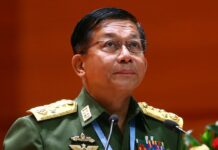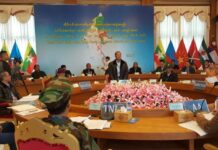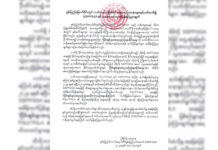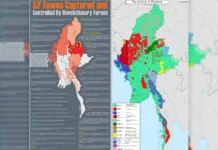With the coinciding symbol of 9999, the meeting, on 9 September, with 9 members delegation – 5 high-level Ethnic Armed Organizations (EAOs), together with 3 EAOs’ Senior Delegation (SD), plus 1 extra add up member – met with the President, at 09:00, in Naypyitaw, to iron out the remaining glitches of “all-inclusiveness”.
It is quite strange that given the original, EAOs leadership summit decision to send 8 members delegation – 5 different ethnic leaders and 3 SD executives, was added with another one from the KNU member – Padoh Kwe Htoo Win -, making it to count 9 altogether.
As it is not a secret that since the successive military top brass has always been keen to rely on astrological suggestion, whenever important stakes are at play, one couldn’t help to think that this is also not a coincidence but stage-managed scenario, aimed at helping the President to achieve, what he has been after for so long.
Whatever the case, the controversial issue of “all-inclusiveness”, which has been hindering the Nationwide Ceasefire Agreement (NCA) process seems to be making headway, with the President’s flexibility and accommodation promises, if his words are to be taken seriously, and provided the military would follow his lead, in a true sense.
The regime doesn’t seem to be budging from its stance of signing the NCA with only its chosen 15 EAOs that have signed bilateral ceasefire agreement. According to Hla Maung Shwe, of the Myanmar Peace Center (MPC), the President is principally in agreement with “all-inclusiveness”, but only wants the notion to be implemented through pragmatic or progressive realisation, which means sticking to its original position of signing with the 15 EAOs, that the regime has chosen.
The 15 EAOs are: National Democratic Alliance Army (NDAA), National Socialist Council of Nagaland – Kaplan (NSCN-K), Restoration Council of Shan State (RCSS), United Wa State Army (UWSA), Arakan Liberation Party (ALP), Chin National Front (CNF), Democratic Karen Benevolent Army (DKBA), Karenni National Progressive Party (KNPP), Karen National Union (KNU), Karen Peace Council (KPC), New Mon State Party (NMSP), Pa-O National Liberation Organization (PNLO), Shan State Progress Party (SSPP), Kachin Independence Organization (KIO) and All Burma Student Democratic Front (ABSDF).
However, the President did show some flexibility, if it could be called one. According to The Global New Light of Myanmar today, a government mouthpiece, it writes:
Of the six groups that the government has so far not included in the deal, an agreement has been reached for three to take part in political dialogue. These three parties include the Lahu Democratic Union, Arakan National Council and Wa National Organisation, MPC’s senior adviser said.
Separate talks appear set to be held with the Myanmar National Democratic Alliance Army, while the Ta’ang National Liberation Army is reportedly likely to sign the national ceasefire accord if it reaches bilateral agreement with the government.
During the talks, the president said that the government hopes that a single agreement may be signed with all three Arakan groups, the Arakan National Council, the Arakan Liberation Party and the Arakan Army – the latter of which is based in the KIO-held territory.
But although the Lahu Democratic Union (LDU), Arakan National Council (ANC) and Wa National Organization (WNO) issue of participation in the upcoming political dialogue phase, without signing the NCA, coupled with the lifting of Section 17/1 Unlawful Association Act, might possibly be accepted by the EAOs leadership, the Kokang issue that the President is said to be handling personally has no substance or transparency, whatsoever, that the Myanmar National Democratic Alliance Army (MNDAA) will be on board of NCA signing.
Hla Maung Shwe, according to The Irrawaddy report of 9 September, said that Thein Sein would also invite the MNDAA to join the ceasefire signing “as the president is directly communicating with the MNDAA leader.”
When contacted by The Irrawaddy recently, the Kokang group’s spokesperson Htun Myat Linn said they “have no direct communication with the President on the issue.” He added that the MNDAA intended to work together with all ethnic armed groups for an all-inclusive pact.
The same report also said the TNLA, spokespersons on both sides said settlement had been reached on a government proposal that the group first sign a bilateral ceasefire agreement, followed by accession to the nationwide accord.
However, the fusion of three Arakan groups, the Arakan National Council, the Arakan Liberation Party and the Arakan Army and to be signed as one remains a mystery, on how it could be worked out among themselves, and as well if it would be acceptable to the government.
On top of that statements coming out from CNF leader Pu Zing Cung could be interpreted in two ways.
He told VOA, on 9 September that the decision has not yet been made, on whether to sign or not to sign. The top ethnic delegation will report the outcome of the meeting to the Central Executive Officers and would decide on how to handle the all-inclusiveness case of signatories, who will be going to sign and so on.
He analyzed the meeting situation as follows: “I see it as being a good (meeting). Because looking at the condition of negotiation, regarding our four groups – meaning KNU, KPC, DKBA and RCSS -, it could be said it is already in order. The case of MNDAA is being directly handled by the President, which seems to be workable. And the case of AA, by searching for answer the ways as have been done, would be able to reach a workable condition.”
The above four groups have released a statement prior to the EAOs summit meeting a few weeks back that they would go ahead with the signing of NCA, even if it is not “all-inclusive”, which is the position of the Nationwide Ceasefire Coordination Team (NCCT), from the outset. But the four groups insisted that they will work for all-inclusiveness from within for those are left out of NCA signing for nay reason.
Thus, it would mean, the four groups would sign even without all EAOs participation. The speculation is rife that at least nine EAOs would sign, if the regime would go for its Plan B, of “open book signing” scheme, if the NCA could not be signed by all.
And so the “all-inclusive” participation of NCA is still not a sure thing, as have been reported. The tendency of tilting towards real all-inclusive norms would hinge on whether the President could deliver, especially, with regards to Kokang participation issue, a thorn in the eyes of the military and professed number one enemy, besides being able to woo the UWSA – which until now has waited silently on the side line and saying that it won’t sign the NCA, but participate only during the political dialogue phase – into the fold.
For now, it could be said that the realization of the NCA is still up in the air, whether it is pulled through with astrological ritual help or not.
The contributor is ex-General Secretary of the dormant Shan Democratic Union (SDU)-Editor

















Leave a Comments